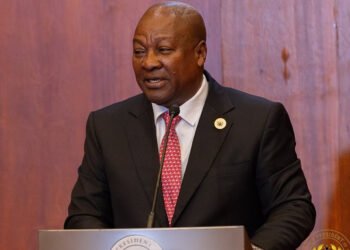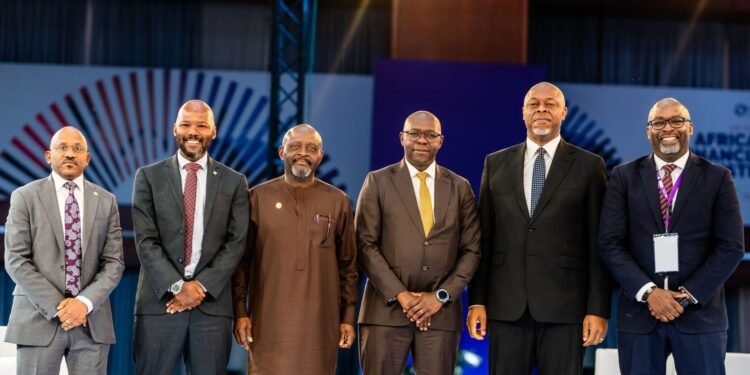Ghana is poised for a major transformation in its transport and logistics sector, with an ambitious plan to expand its road network from 78,000 kilometers to 253,000 kilometers by 2047.
The vision, outlined by the Chairman of the National Development Planning Commission (NDPC), Dr. Nii Moi Thompson, under the Ghana 30 Infrastructure Plan, is expected to cost approximately $272 billion and aims to create a smarter, more efficient road system that will accelerate economic growth and national development.
Speaking on the government’s long-term vision, Dr. Thompson stated that the plan goes beyond merely constructing new roads. It seeks to address structural inefficiencies in Ghana’s transport network while integrating a bus rapid transit (BRT) system to enhance public transportation in major cities.
“The government is committed to delivering the bus rapid transit system to increase use of public transportation in major urban areas. Additional bus routes will be created to connect major cities”.
Chairman of the National Development Planning Commission (NDPC), Dr. Nii Moi Thompson
Touching on the feasibility of raising the $272 billion needed for such an undertaking, Dr. Thompson clarified that the figure is indicative, meant to reflect the scope of the ambition rather than a fixed financial requirement. He emphasized that the plan incorporates strategies to “maximize the utilization of local resources and materials,” which will reduce costs and promote domestic participation in infrastructure delivery.

He also shed light on the financing models that will guide implementation, outlining two broad approaches: the “pay-as-you-go” model and the “intergenerational financing” approach.
“In Ghana, we’ve largely been relying on the pay-as-you-go method, where you collect revenue and pay for infrastructure as you go. That approach isn’t sustainable for big-ticket items.
“The second model, intergenerational financing, is based on the idea that the infrastructure we build today will benefit future generations. So, the cost should be spread across generations.”
Chairman of the National Development Planning Commission (NDPC), Dr. Nii Moi Thompson
Sound Infrastructure Governance
This model, Dr. Thompson explained, typically takes the form of long-term borrowing through bonds and concessional loans. However, he was quick to stress that sound infrastructure governance will be at the heart of the process to ensure transparency and accountability in how funds are used.
“Every single pesewa spent must be accounted for. Efficiency in the delivery process will be highly critical—otherwise, you can spend all that money and end up with virtually nothing”.
Chairman of the National Development Planning Commission (NDPC), Dr. Nii Moi Thompson
Citing Ghana’s past borrowing practices as an example, he referenced the $11.025 billion raised through Eurobonds for debt management and infrastructure development, which yielded little visible progress.
“Within a few years, we were in debt distress, and there was virtually no infrastructure to show for it. That’s why infrastructure governance will play a major role in this new plan” .
Chairman of the National Development Planning Commission (NDPC), Dr. Nii Moi Thompson
Dr. Thompson further explained that while the focus is often on roads, the Ghana 30 Infrastructure Plan takes a broader view of “transport and logistics.” The NDPC, he revealed, has set up nine thematic committees, one of which is dedicated to transport and logistics planning. “It’s one thing to build a road, but how the road is utilized and the purposes for which it’s utilized are equally important,” he noted.

Distinction Between Domestic and External Financing
On the distinction between domestic and external financing, Dr. Thompson argued that there is nothing inherently wrong with sourcing infrastructure financing from abroad, as long as it is leveraged strategically.
“You can have $10 billion and leverage that to raise $100 billion. There’s absolutely nothing wrong with getting infrastructure financing from abroad—it’s done globally”.
Chairman of the National Development Planning Commission (NDPC), Dr. Nii Moi Thompson
However, he acknowledged that Ghana’s historical dependence on international capital markets has exposed the country to risks such as unfavorable borrowing terms and foreign exchange (FX) exposure. “In some countries, there are laws against borrowing short-term to finance infrastructure. A finance minister could even go to jail for doing that,” Dr. Thompson remarked.
He added that Ghana’s crisis was not just about borrowing but about how borrowed money was used. “If the funds had truly gone into infrastructure, the projects would have paid for themselves and become self-sustaining,” he argued.
Dr. Thompson underscored that the NDPC’s plan will ensure no borrowing is done without oversight. “We can’t have people going to Parliament to borrow for infrastructure when there’s zero accountability. No one should again be in a position to say we borrowed $11 billion, and yet there’s no evidence of what it achieved,” he said.
Big Push Infrastructure Drive
Touching on the government’s “Big Push” infrastructure initiative, which the Finance Ministry plans to double in the 2026 budget, Dr. Thompson said the NDPC is taking steps to diversify funding sources beyond oil revenues.
“We are going to set up a team to look at all the sources and strategies for financing infrastructure. We need to explore infrastructure bonds, not just at the national level but also for district assemblies—municipal bonds, as we call them”.
Chairman of the National Development Planning Commission (NDPC), Dr. Nii Moi Thompson
He added that Ghana’s macroeconomic environment will be key to unlocking these financing opportunities. “High inflation has made borrowing expensive. Once inflation stabilizes, we can make better use of bonds,” he said.

Dr. Thompson pointed out that there are already large pools of untapped domestic capital that could be redirected toward infrastructure investment.
“One of our pension funds alone has around GHS100 billion, looking for investment opportunities. Last year, Ghanaians invested about $2 billion in cryptocurrencies abroad because there are few local options. We must change that”.
Chairman of the National Development Planning Commission (NDPC), Dr. Nii Moi Thompson
The NDPC, he disclosed, will soon establish a special committee to assess all viable financing possibilities and advise the President on the best path forward. “Our duty is to advise the President, and that’s exactly what we’ll do,” Dr. Thompson affirmed.
If executed effectively, the Ghana 30 Infrastructure Plan could redefine the country’s transport landscape—enhancing mobility, reducing travel time, and fostering inclusive economic growth. More importantly, the plan signals a decisive shift toward smarter, accountable, and future-oriented infrastructure development that benefits generations to come.
READ ALSO: World Bank Hails Ghana’s Mining Strength as Gold Output, Exploration Activity Surge






















